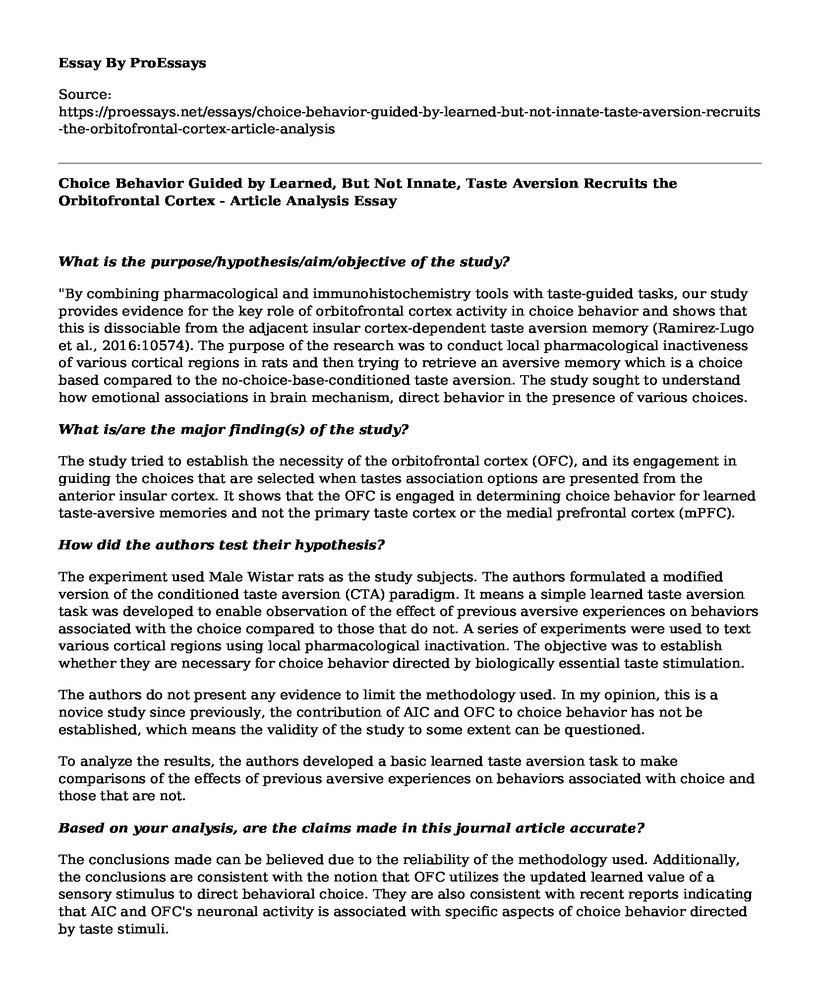What is the purpose/hypothesis/aim/objective of the study?
"By combining pharmacological and immunohistochemistry tools with taste-guided tasks, our study provides evidence for the key role of orbitofrontal cortex activity in choice behavior and shows that this is dissociable from the adjacent insular cortex-dependent taste aversion memory (Ramirez-Lugo et al., 2016:10574). The purpose of the research was to conduct local pharmacological inactiveness of various cortical regions in rats and then trying to retrieve an aversive memory which is a choice based compared to the no-choice-base-conditioned taste aversion. The study sought to understand how emotional associations in brain mechanism, direct behavior in the presence of various choices.
What is/are the major finding(s) of the study?
The study tried to establish the necessity of the orbitofrontal cortex (OFC), and its engagement in guiding the choices that are selected when tastes association options are presented from the anterior insular cortex. It shows that the OFC is engaged in determining choice behavior for learned taste-aversive memories and not the primary taste cortex or the medial prefrontal cortex (mPFC).
How did the authors test their hypothesis?
The experiment used Male Wistar rats as the study subjects. The authors formulated a modified version of the conditioned taste aversion (CTA) paradigm. It means a simple learned taste aversion task was developed to enable observation of the effect of previous aversive experiences on behaviors associated with the choice compared to those that do not. A series of experiments were used to text various cortical regions using local pharmacological inactivation. The objective was to establish whether they are necessary for choice behavior directed by biologically essential taste stimulation.
The authors do not present any evidence to limit the methodology used. In my opinion, this is a novice study since previously, the contribution of AIC and OFC to choice behavior has not be established, which means the validity of the study to some extent can be questioned.
To analyze the results, the authors developed a basic learned taste aversion task to make comparisons of the effects of previous aversive experiences on behaviors associated with choice and those that are not.
Based on your analysis, are the claims made in this journal article accurate?
The conclusions made can be believed due to the reliability of the methodology used. Additionally, the conclusions are consistent with the notion that OFC utilizes the updated learned value of a sensory stimulus to direct behavioral choice. They are also consistent with recent reports indicating that AIC and OFC's neuronal activity is associated with specific aspects of choice behavior directed by taste stimuli.
What is the importance of this scientific work?
The study makes a significant contribution since it avails novice evidence concerning the essential function played by OFC in directing choice behavior that is separable from the adjoining taste aversion memory dependent on AIC. It is a strong scientific study since it seeks to develop knowledge on an aspect that has not been previously understood.
What is the take home message of this article?
The study shows the significant role of OFC in directing choice behavior that is separable from the adjoining taste aversion memory dependent on AIC.
References
Ramirez-Lugo, L., Penas-Rincon, A., Angeles-Duran, S., & Sotres-Bayon, F. (2016). Choice Behavior Guided by Learned, But Not Innate, Taste Aversion Recruits the Orbitofrontal Cortex. Journal of Neuroscience, 36(41), 10574-10583. doi: 10.1523/jneurosci.0796-16.2016
Cite this page
Choice Behavior Guided by Learned, But Not Innate, Taste Aversion Recruits the Orbitofrontal Cortex - Article Analysis. (2022, Jun 19). Retrieved from https://proessays.net/essays/choice-behavior-guided-by-learned-but-not-innate-taste-aversion-recruits-the-orbitofrontal-cortex-article-analysis
If you are the original author of this essay and no longer wish to have it published on the ProEssays website, please click below to request its removal:
- Stress Management for Patients With Rheumatoid Arthritis
- Evaluation Essay on Nightingale Community Hospital
- New Approach to Minimize Postoperative Pain in Bariatric Surgery Paper Example
- Essay Sample on Learning Disability of America
- Vegan Diet Essay Example
- Essay on Feeding Young Children: Communication and Learning Through Eating Experience
- 150 Years of St. Elizabeth Healthcare: A History of Providing Quality Care - Report Sample







